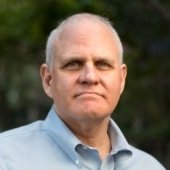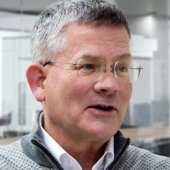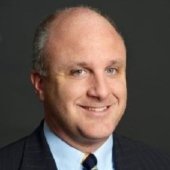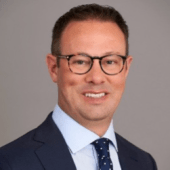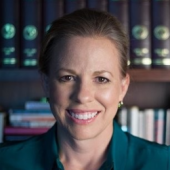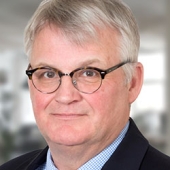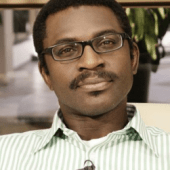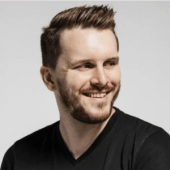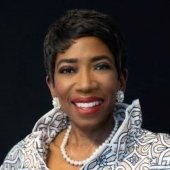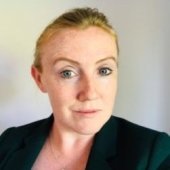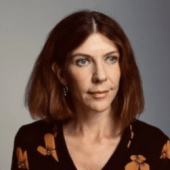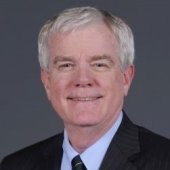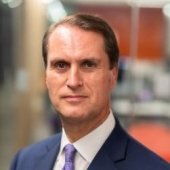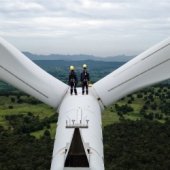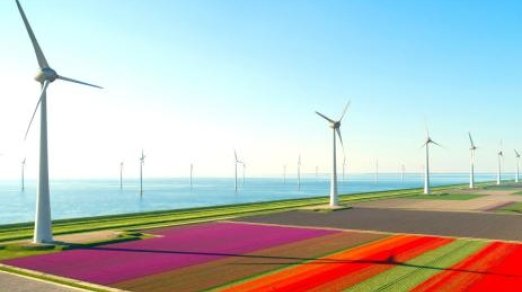IN BRIEF
- 2:30 - We have these really large shared challenges in the world — climate change and inequality being kind of the two mega challenges — and we can’t do it alone. Companies need to move in partnership and they need to be setting a higher ambition than just being a little less bad every year.
- 4:15 - The issues that companies are expected to have a position on have expanded dramatically in the last few years. CEOs feel this pressure to say something about climate and inequality, but also about LGBTQ+ rights and racial equity, about democracy itself, about misinformation.
- 13:30 - Part of what it means to get ready is to just recognize the scale of what’s happening and start to get your head around how fast things are moving. We’re living in what the military calls a VUCA world — Volatile, Uncertain, Complex, Ambiguous — and just start to get your head around that. I think that’s how you prepare for a future and build a more resilient business.
Joe Kornik, Editor-in-Chief of VISION by Protiviti, welcomes back to the program Andrew Winston, a globally recognized expert on megatrends and how to build resilient, profitable companies by helping people and the planet thrive. He is one of the most widely respected strategists and speakers on sustainable business. His latest book, Net Positive: How Courageous Companies Thrive by Giving More Than They Take, co-authored with the renowned former CEO of Unilever, Paul Polman, is one of the Financial Times’ best business books of the year.
Video transcript
Joe Kornik: Welcome to the VISION by Protiviti interview. I’m Joe Kornik, Director of Brand Publishing and Editor-in-Chief of VISION by Protiviti, our global content initiative looking into the future to examine big themes that will impact the C-suite and executive boardrooms worldwide. Today, we’re exploring the future of ESG and its strategic implications for people, process, and the planet. I’m thrilled to welcome in Andrew Winston. Andrew is a globally recognized expert on megatrends and how to build companies that thrive by serving the world. He is one of the most widely read writers on sustainable business with regular columns in the Harvard Business Review and MIT Sloan Management Review. His latest book, “Net Positive: How courageous companies thrive by giving more than they take,” co-authored with the renowned CEO, Paul Polman, is one of the Financial Times’ best business books of the year. Andrew, thanks so much for joining me today.
Andrew Winston: Glad to be here. Thanks for having me.
Joe Kornik: Andrew, in the intro I mentioned your latest book, Net Positive. You said you wrote that book to help leaders raise their ambitions and build companies that profit by solving the world’s problems, not creating them. As you’ve said, “Is the world better off because your business is in it?” I think many companies would certainly like to think the answer to that question is yes, and I know your vision of the future revolves around the idea of net positive, which is the title of your book. Could you explain to me what net positive is?
Andrew Winston: Yeah. Sure. Happy to. So you got the gist of it. I think the core question is this idea of checking yourself and your business and saying, “Are we really helping the world? Is the world better off because we’re in it and we exist?” So my co-author, Paul Polman, and I, we define a net positive business as one that solves the world’s problems, not contributing to them, and does that by creating wellbeing for everyone that they impact; that’s employees and consumers and suppliers, communities, investors, all of their stakeholders, and kind of in everything they do, every product, every service, every operation. It’s a north star. There’s no company that can really claim that yet, and I think there’s companies moving on pieces of it and we’ll probably unpack that a little bit, but it’s where we need to head. The logic is kind of compelling. We have these really large shared challenges in the world — climate change and inequality being kind of the two mega challenges — and we can’t do it alone. Companies need to move in partnership and they need to be setting a higher ambition than just being a little less bad every year. We have to be moving for something that’s more regenerative, that’s circular, that’s creating value for society while profiting. That’s the path to creating value in business now.
Joe Kornik: Right. I feel like we’ve gone through a bit of an evolution of late, whether it’s the pandemic or just some of what’s going on in the world, and I think the nature of corporate responsibility certainly has changed or is changing. I mentioned it’s sort of evolving. So where do you think it is today and where do you think it’s going? Where could it be maybe a decade from now?
Andrew Winston: Yeah. So I mean even the phrase “corporate responsibility” is kind of dated, right? The corporate social responsibility idea really did come from more of a philanthropic idea or just kind of reacting to pressures from NGOs or complying with the law. It was really pretty basic. I’ve been in this space of business overlapping with society and with environment for about 20 years and I’ve never really seen anything like the last few. There’s been more change in what’s expected of business and what it means to be a business. More change in the last few years than the previous 20, and so it really did used to be about answering to some questions in the world, showing that you’re a decent citizen, maybe helping your employees kind of think about their impacts on the world. It was pretty basic stuff and now you’ve gotten to a place where the way we think about how businesses even create value has shifted. The issues that companies are expected to have a position on has expanded dramatically in the last few years. So CEOs feel this pressure to say something about climate and inequality, but also about LGBTQ+ rights and racial equity, about democracy itself, about misinformation. When the invasion of Ukraine happened, hundreds of companies had to take a position on their business in Russia. So it’s this much larger question now about what’s your role in society and who are you as a business? What is your purpose? Who do you serve? Is it just shareholders in the short run or is it a full range of stakeholders that then produce a shareholder value? That’s a fundamental change in how we think about business.
Joe Kornik: Yeah, that’s interesting. I know in in your book one of the things I thought was really interesting is when you and Paul touched on the fact that some companies think that they can’t afford sustainability and I thought that was interesting. How should they think about how they invest and spend money in those areas?
Andrew Winston: Well I’ve been doing this, as I said, for 20 years and pretty much almost every conversation I have — media interviews or podcasts, talks I give — I get some version of that question of, “Well, isn’t it more expensive?” or, “How can we afford this?” And it really is an incredible myth and really, it’s something that this kind of burden is placed on things that are called sustainability to prove that they pay out immediately or they never cost a penny that we never ask of really any other investment in business. Everything is a capital investment. “Are you going to put money into marketing? Into R&D? Into your people?” and on and on. The things that fall under sustainability — making your business more resilient, reducing your carbon footprint, reducing human rights issues in the supply chain, this long list of issues, those are things you choose to do to make your business better. These are investments and I think we have to change our thinking from it being always some cost to thinking of it as an investment. Some things absolutely pay back kind of immediately and there’s lots that fall under the sustainability bucket that create value in kind of the traditional ways. You cut costs, you reduce risk to the business, you innovate and drive revenues, or you build this kind of hard to measure intangible value that is the majority of the value for most companies. All of these things are value creation areas that are core to any business and sustainability can do all of them. It can provide all of those. So it’s kind of the wrong question, “Can we afford this?” I mean increasingly the question should really be, “Can you afford not to?” The world is expecting this. The solutions we have in front of us are getting cheaper and cheaper. I think we’ve moved from, “Why do this?” to, “Why aren’t we doing this?” and the leaders are just moving ahead very quickly.
Joe Kornik: Right. I’m going to stay on the topic of investment if I could because I know there’s been sort of a rush of money into ESG investment funds. I think you said more than $1 trillion over the last two years. Do you think that movement toward ESG investing is real and lasting? Do you think it’s a lasting effect?
Andrew Winston: It’s a question that I think about a lot because really almost the last kind of key stakeholder to get to the table on this was investors and that’s one of the deep changes in the last couple of years, has been investors coming and asking companies way more questions. In the investor meetings they’re asking about their climate footprint, their material issues in their business that affect their business, and the SEC has just announced they’re going to be requiring public companies to discuss their climate risk and put out data on their footprint, on the carbon emission. So it’s becoming something not just investor, but regulated so that that gives it legs, right? If it becomes institutionalized, then it’s going to last. Look, there’s a little bit of a back off. There’s been money rushing in. It’s actually going a little bit reverse lately because because of the war and inflation, oil prices skyrocketed so now all of a sudden the fossil fuel companies are doing extremely well in the short run and so there’s money pouring almost back into traditional full index funds because the ESG funds tend not to have the fossil fuel companies. I think this is all just kind of short run machinations. In reality, this is a long-term permanent trend and part of the reason is that the forces driving this, they’re not theoretical models, like climate change is happening and costing businesses real money, and the kind of demographic pressure; younger generations of employees and consumers are demanding more of companies. From what I understand talking to some of the banks about the pressure they feel, they’re hearing from their private wealth customers, the holders of so much of the world’s wealth and it’s coming from the younger generations. They’re asking about impact investing. That’s part of the reason this has all happened, is that the younger generations are saying, “Great. Grandpa, we’ve got $100 million in the bank, but what does it do? What’s it for?” and I don’t think that’s going away. With generational shifts, these are kind of changes in norms. I don’t think that’s going back. So whether the oil price is up or down really doesn’t matter. The money that’s looking for some social impact is going to be there.
Joe Kornik: Right. This whole concept of sustainability and ESG, I mean you mentioned that a little while ago that you’ve seen more change in the last few years than perhaps over the last two decades. So I’ve heard you say that sustainable business sort of went mainstream, if you will, in 2021 and certainly I think that was probably aided by obviously extreme weather and climate change and the need for companies to be more transparent, global social unrest, all of those sort of factors coming together, but you see business being able to sort of lead the way forward here, I think. So that’s encouraging and not in like a compliance way or regulatory way, but in a real strategic way. Is that accurate?
Andrew Winston: Right. I think this isn’t some extreme statement now. I’ve talked about the investors coming to the table and that’s part of what kind of made it more mainstream, but the kind of world’s largest investor, Larry Fink, who is the CEO of BlackRock, has about $10 trillion under management. He’s been writing a letter to CEOs every January for years. The last six or seven years have been about sustainability or ESG, and increasingly about climate. He’s kind of put this into the same words that I’ve been sharing with you, the same ideas. He says being stakeholder driven, this isn’t “woke.” There’s kind of this push back now on ESG that it’s somehow a progressive agenda. He says, “This isn’t woke, this is capitalism. This is how you create value,” and in some way it’s really just a throwback, right? Companies were founded originally, especially the really old ones, for a purpose, right? There’s some reason. There’s some need you’re filling. A company exists to solve a need for a customer. It doesn’t actually exist to create shareholder value. That’s what a company does by doing something, producing something, providing a service, and we kind of lost our way on that, right? So I think business now is so integrated into society and so large, right? They’re such a huge part of the economy and the jobs and the capital flows, that they kind of have to lead on these things. They have to be thinking in terms of shareholders and the systems that they operate in, and I think there’s increasing recognition in business that that doesn’t mean they’re replacing some government role. It’s that they have to work with government. That this idea that government’s always a problem, business is always right or vice versa, depending who you’re talking to, are both kind of ludicrous. That we need the whole system at the table to solve our really big problems. And markets can’t solve everything. That’s kind of been this myth for 50 years, right? That free markets will solve everything. Free markets don’t solve these kind of big shared issues that include what economists call externalities like the free dumping of carbon into the air. Companies don’t pay for that so that’s not going to be a market solution until we fix the markets.
Joe Kornik: Right. I’ve also heard you say that you think our biggest challenges going forward will be inequality and climate change essentially. So sort of the E and the S of the ESG, if you will. I know you’ve challenged business leaders to think bigger. So what can and should they be thinking about doing to prepare for this future and a decade from now let’s say?
Andrew Winston: Well, I think it keeps feeling like the decade ahead is coming closer. Things that we didn’t think would happen come faster and part of what I talk about a lot and in the writing I do and the speeches I do is about exponential change, and that’s part of what’s happened over the last 10 ten years but over the last century, exponential growth in in population, exponential growth in emissions, exponential change in inequality. Just this huge rush of money over the last 40 to 50 years almost entirely — pretty much all the wealth and income gains — to the top 1% and it’s destabilizing, right? This is just kind of just dangerous for society. So I think part of what it means to get ready is to just recognize the scale of what’s happening and start to get your head around how fast things are moving. They seem to be getting faster, right? We’re living in this what the military calls a VUCA world — Volatile, Uncertain, Complex, Ambiguous — and just start to get your head around that. I think that’s how you prepare for a future and you build a more resilient business. I think getting ready for 2030 or even 2025 means really starting to understand where you sit in the world against these really big issues. How do you affect climate and inequality? How do they affect you? What can you do about them? And understand what your stakeholders expect of you, your employees in particular, now and in the future, get a handle on your impacts, understand your footprint. These are kind of the initial steps and some companies are pretty deep and far into this already. On the website for our book, netpositive.world, we have a readiness assessment that you can download that lays out these kinds of ideas, like, “Here’s the questions you should be asking to start to prepare to accelerate and be ready for a kind of different world.” I think what we learned in the pandemic and in the last few years with supply chain problems is that we didn’t actually build our economic system for resilience. We built it for efficiency. And sometimes those things are at odds. So we built things so maybe we make one thing in one place, which is definitely the cheapest way to do it, but then if something happens in that one location, there’s a storm or it gets shut down because of COVID, everything’s screwed up. And that’s kind of what’s happened, right? So we need to think more in broad resilience, in partnerships, just making a much more resilient kind of business ecosystem so that you’re ready for changes that we can’t fully predict. I think you need to have built trust with your stakeholders and built relationships that you can rely on when things change fast.
Joe Kornik: Right. So Andrew, last question from me. Thank you so much for your time today. What we like to do here at VISION is look a decade out and get some smart people to give us their opinions about where we’re headed and how we need to be prepared when we get there. So when you look a decade out or more even, let’s say 2035, where do you see sustainability in terms of your overall optimism? Will we be in a better place? I certainly hope we will be, but I’d love to hear your opinion on that.
Andrew Winston: Look, I think there’s some things that are really tough right now and that are getting harder and it’s hard to say what’s going to happen. We’re seeing, most troubling, a decline in democracy around the world and a rise in autocracy. Less connection between people, more divisiveness. I mean this stuff is really hard to predict where that goes and that affects business and I think business increasingly is getting involved in these issues in democracy and in voting and people’s rights. So I think business will be more deeply embedded in these issues. There’s things that will definitely be different. The technology — again, things are changing exponentially. If we’re talking like 2035, most cars sold in the world will be electric vehicles. The grid will be moving very quickly to all renewables. I have faith all that’s going to happen and the Gen Zs and young Millennials that have different views of business will now be more in charge at that point, right? They’re going to be taking more senior positions and I think that just changes again the norms of how business operates. So I had an interesting moment speaking recently in an event for big hospitality company and after I spoke, the general counsel got up and said, “You know, I think we got to get to a point where we don’t even call it sustainability or ESG. It’s just how we do business.” Now, this is amazing cause this is the kind of language I and people like me that have been writing about this and working on it for years, that’s what we’ve been saying and to hear a general counsel at just a big public company say that tells me that we’re getting somewhere because that’s the right idea, that this is just how you do business, that you don’t accept a business that creates a lot of excess carbon or where there’s child labor and human rights issues. You just don’t accept that as how we do business. I’d like to think by that point 10-15 years from now the norms will be even clearer and the ones who are not on the right path are going to be becoming irrelevant very quickly and on the upside, the ones who are doing it right I think will just be taking more and more of the share of their market. I think it’s going to be good for those who build a sustainable, thriving business now.
Joe Kornik: Great. Thank you so much, Andrew, for your time today. What an enlightening conversation. Thank you for watching the VISION by Protiviti Interview. I’m Joe Kornik. We’ll see you next time.
Did you enjoy this content? For more like this, subscribe to the VISION by Protiviti newsletter.






